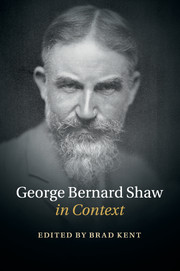Book contents
- Frontmatter
- Dedication
- Contents
- List of illustrations
- Notes on contributors
- Preface
- Acknowledgements
- A Chronology of Shaw's Works
- List of abbreviations
- PART I PEOPLE AND PLACES
- PART II THEATRE
- PART III WRITING AND THE ARTS
- PART IV POLITICS
- PART V CULTURE AND SOCIETY
- 31 Celebrity
- 32 Education
- 33 Evolutionary theory
- 34 Health and vegetarianism
- 35 Language
- 36 Nature
- 37 Philosophy
- PART VI RECEPTION AND AFTERLIFE
- Further reading
- Index
- References
34 - Health and vegetarianism
from PART V - CULTURE AND SOCIETY
Published online by Cambridge University Press: 05 October 2015
- Frontmatter
- Dedication
- Contents
- List of illustrations
- Notes on contributors
- Preface
- Acknowledgements
- A Chronology of Shaw's Works
- List of abbreviations
- PART I PEOPLE AND PLACES
- PART II THEATRE
- PART III WRITING AND THE ARTS
- PART IV POLITICS
- PART V CULTURE AND SOCIETY
- 31 Celebrity
- 32 Education
- 33 Evolutionary theory
- 34 Health and vegetarianism
- 35 Language
- 36 Nature
- 37 Philosophy
- PART VI RECEPTION AND AFTERLIFE
- Further reading
- Index
- References
Summary
Between the explosion of late Victorian reform movements and avant-garde societies and the culmination of his self-education in the reading room of the British Museum, Shaw's first two decades in London constituted a kind of intellectual perfect storm that galvanised the creation of G.B.S. and solidified many of his social, artistic, and political views, particularly those concerning matters of health. In the early summer of 1881, Shaw came down with smallpox, despite having been vaccinated as a child, and the experience was a crucible for his lifelong beliefs on the practice of medicine. The resulting facial scars, hidden for the rest of his life by his famous beard, were as permanent as his eventual certainty that medical science was buoyed by superstition and driven by outright fraud. Starting in 1897, Shaw's six-year tenure as a vestryman included considerable service on the Health Committee, involving him in a broad range of community hygiene issues, from free public lavatories for both sexes to cremation. As Michael Holroyd details, ‘he visited workhouses, hospitals, sweatshops and the homes of the poor, and saw the destitution and disease. Many of the tenements were lice-ridden; there were epidemics of smallpox, and occasional cases of typhoid fever, and even bubonic plague. Houses were disinfected with sulphur candles, on the fumes of which pathogenic bacilli actually multiplied’. To the playwright, inoculation was a program driven more by government monetary incentives than treatment and prevention, and disease was a byproduct of poverty whose spread could be curbed by legislation improving sanitation as well as living and working conditions and by instituting a more equitable socio-economic system, including a nationalised health service predicated on wellness rather than profit.
Frustrated by local government's demands of time and energy, not to mention its inherent delays, bureaucracy, and incompetence, Shaw preferred to wage an intense campaign on these issues through contributions to newspapers and periodicals of all sorts. Holroyd writes that ‘Shaw treated the press as a democratic instrument through which he poured information and advice to the public and from which he hoped to get instructions formed by that advice’. Shaw's perspectives on public health issues immediately aligned him with liberal activism, and he devoted countless hours to speaking and writing on behalf of a range of causes about which he felt strongly.
- Type
- Chapter
- Information
- George Bernard Shaw in Context , pp. 281 - 288Publisher: Cambridge University PressPrint publication year: 2015



